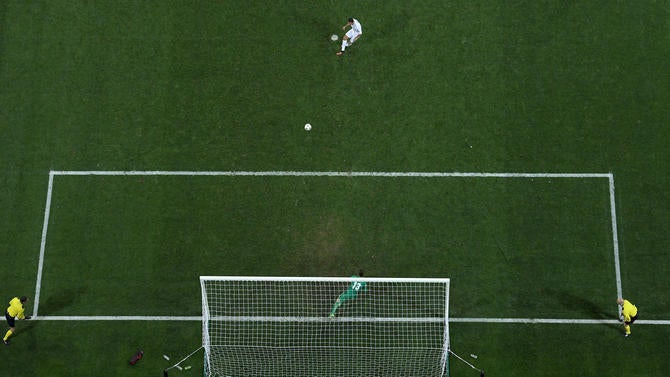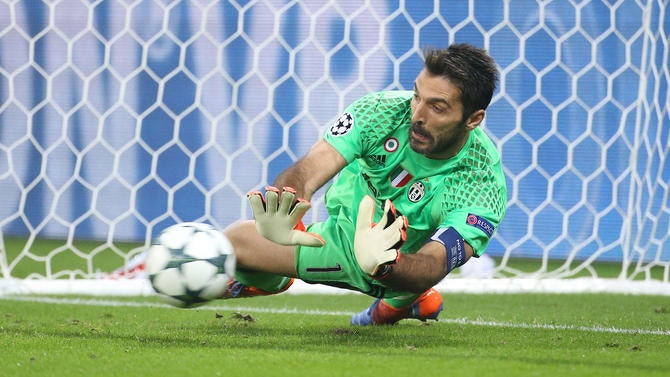On Saturday, two European titans will clash for the right to be crowned the king of the continent. Real Madrid and Juventus will meet at Millennium Stadium in Cardiff for the UEFA Champions League final. The matchup will feature one of the best strikers on the planet in Cristiano Ronaldo and one of the greatest goalkeepers of our generation (and possibly of all-time) in Gianluigi Buffon. It is a rematch of the 1998 final, which featured Zinedine Zidane playing up top and Buffon between the goalposts for the zebra-striped side out of Italy.
On Saturday, the 44-year-old Zidane, a former Galactico, will be on the Real Madrid bench and Buffon, 39, will be on the field in what could very well be his last shot at a major European trophy. These two have quite a history.
i still think about what zidane did to buffon in the 2006 world cup final pic.twitter.com/kyOl14LaDn
— Igor Mello (@SuperIgor) June 1, 2017
Such a savage move by Zidane. It takes guts doing that to one of the greatest goal-stoppers we've seen, let alone during a World Cup final.
In light of that, and because of the way last year's final was decided (Real Madrid topped city rival Atletico Madrid in a penalty shootout), we pose the following question: If the Champions League final remains tied after 120 minutes, which team has the edge in a penalty shootout? Spanish economist Ignacio Palacios-Huerta, author of Beautiful Game Theory: How Soccer Can Help Economics, suggests you should pay more attention to the coin toss before the start of the penalty kick showdown. Ignacio has built a database tracking thousands of kicks since the inception of the penalty shootout in 1970. His study suggests that the team that kicks first in the shootout wins 60 percent of the time.
"The edge goes out of the window when the advantage to be leading randomly given by the coin disappears," Palacios-Huerta said to CBS Sports. "Note that the psychological mechanism is one in which a coin randomly gives a team a greater likelihood to be leading and to the other team a greater likelihood to be lagging. It's this leading/lagging asymmetry randomly assigned through the kicking order that has an impact on performance. It may disappear or reverse depending on the performance during the shootout. But initially we begin from 60-to-40 percent, and not from 50-50."
Before publishing Beautiful Game Theory, Palacios-Huerta shared his theory in a research article published in 2010 for the American Economic Review, arguably the most prestigious academic journal for academic research in economics. He also published a research titled "Professionals Play Minimax" for the Review of Economic Studies, which is the work that started the mathematical analysis of penalty kicks following the theories of John Nash, who you may know from the movie "A Beautiful Mind" and for winning the Nobel Prize in economics for his foundational contributions to game theory. According to Palacios-Huerta, his research paper is the first to prove that Nash's theories are correct in the sense of explaining how people behave when optimal behavior involves mixed strategies.
Teams like the 2008 Chelsea side that lost the Champions League final to Premier League rivals Manchester United in penalty kicks and the 2010 Netherlands World Cup team have leaned on Palacios-Huerta's research for help in the past. Yes, Palacios-Huerta once helped Holland scheme against his own birth country in the World Cup final. Fortunately, or unfortunately, the match did not need penalties, as it was decided in extra time thanks to an Andres Iniesta goal.
Though a small sample size, 11 of 61 Champions League finals have been decided by penalty kicks. And seven of those 11 winners have taken the first kick, though not all have converted the first kick.
At the conclusion of 130 minutes In last year's Champions League final between Atletico Madrid and Real Madrid, captains Sergio Ramos and Gabi met with match officials for the coin toss to decide which team would kick first. Atletico's Gabi won the toss, but made a crucial mistake according to Palacios-Huertas, by opting his team to kick second.
"In my opinion, commentators and the TV cameras should look very closely to the coin toss and to the choices that the captains make [kick first or second] as it is the most important determinant of the winner of the shootout," Palacios-Huerta said while pointing out the the 60 percent odds of the team that kicks first compared to the 40 percent odds of the team that kicks last. "A 20 percent advantage is huge! Of course, one may barely notice it by looking one shootout at a time, but it is a very, very substantial advantage."
Real Madrid converted all five of their tries which left the Red-and-Whites chasing throughout the entire showdown. After Antoine Griezmann, Gabi and Saul converted the first three kicks, JuanFran hit the post on Atletico's fourth attempt. That opened the door for Ronaldo who would go on to convert the fifth attempt to clinch Real Madrid's 11th Champions League title.

Real Madrid has not been involved in a penalty-kick shootout since last year's final. Here's how they lined up to take PKs for that game, and hopefully you'll notice a trend:
- Lucas Vazquez (goal, bottom right corner)
- Marcelo (goal, bottom right corner)
- Gareth Bale (goal, bottom right corner)
- Sergio Ramos (goal, bottom right corner)
- Cristiano Ronaldo (goal, bottom right corner)
Saturday's game in Cardiff will be a homecoming for Bale, who is from Wales, but it seems as if Zidane will give Isco the starting nod. Bale is returning from a three-month injury layoff, though it's plausible to imagine a scenario where he enters the game late in the second half and becomes one of the five kick takers. So the core is pretty much intact for Real if the club finds itself in a similar situation against Juventus.
Ronaldo is familiar to taking the fifth (and usually last) spot kick for Real Madrid, but he has been slotted first in the past for Portugal. Take the quarterfinals of the 2016 Euro against Poland. The Iberian side kicked first, and manager Fernando Santos elected to go with the best player on the field, CR7. It paid off as they won 5-3 in penalty shootouts.
"It turns out that the most important penalties are the first and the last ones (either fourth or fifth)," said Ignacio. "The 'relative importance' of penalty kicks in terms of their impact of the likelihood of winning the shootout is kind of a 'U' shape, with the first and last a bit more important than the others. So, one should place the best kickers first and last."
Ronaldo has been the primary penalty-kick taker for Real Madrid for quite some time. Seven of the nine converted spot kicks for Real Madrid this season have come from the right foot of Ronaldo. Sergio Ramos and James Rodriguez have converted the other two. Of those seven Ronaldo goals, four of them were targeted towards the bottom left corner of the frame, two towards the bottom right corner and one aimed at the top right corner.
Juventus has only been part of one penalty-kick shootout this season, and that came during the Italian SuperCup against AC Milan. Juve won the coin toss, elected to kick first, which gave them the 60 percent edge. Unfortunately for the Turin club, they wound up losing 4-3 on Dec. 23. Here is how they lined up:
- Claudio Marchisio (goal, top right corner)
- Mario Mandzukic (hits top center crossbar)
- Gonzalo Higuain (goal, bottom center of the frame)
- Sami Khedira (goal, bottom left corner)
- Paulo Dybala (shot saved, bottom right corner)
It's worth noting in that game that Juve converted the first kick, and Buffon saved AC Milan's first kick (bottom right corner) and they still went on to lose the shootout round.

So what should be done to break that mental edge awarded to the first team? Should they implement a new system that evens the playing field for penalties? Ignacio has been an advocate for the ABBA system. The ABBA format is modeled after the serve between opponents in tennis tiebreakers. He's proposed the idea in 2010 and 2012, and even contacted FIFA and the International Football Association Board (IFAB) in the past to propose his idea.
Let's put the current and new format side by side for comparison:
Current penalty kick shootout format:
Team A (first attempt)
Team B (first attempt)
Team A (second attempt)
Team B (second attempt)
Team A (third attempt)
Team B (third attempt)
Team A (fourth attempt)
Team B (fourth attempt)
Team A (fifth attempt)
Team B (fifth attempt)
Sequence is repeated in "sudden death" until, subsequently, a winner emerges
Proposed penalty kick shootout format:
Team A (first attempt)
Team B (first attempt)
Team B (second attempt)
Team A (second attempt)
Team A (third attempt)
Team B (third attempt)
Team B (fourth attempt)
Team A (fourth attempt)
Team A (fifth attempt)
Team B (fifth attempt)
Sequence is repeated in "sudden death" until, subsequently, a winner emerges
UEFA became the first governing body in the world of soccer to use the ABBA format for the men's and women's European U-17 Championships in May. The men's semifinal and final was decided by the ABBA-style penalty kicks, with Spain coming out on top in both instances.
"I was quite pleased to see that in their March 3rd meeting they decided to adapt it and start trials with it," Palacios-Huerta said.
Though we can't predict what would happen if Juventus and Real Madrid squared off in a penalty shootout to decide the Champions League final, what we do know is that the science and data will only improve in the future, and it will continue to help kick takers and defenders with their strategies. Palacios-Huerta will continue to fight the good fight to eliminate something as simple as the coin toss after 120 minutes to decide which team kicks first. And until the ABBA system is implemented in all FIFA events, don't take your eyes away from the action -- not even for a bathroom break -- if Saturday's final goes to penalties. Heads or tails could decide the fate of the game.





















